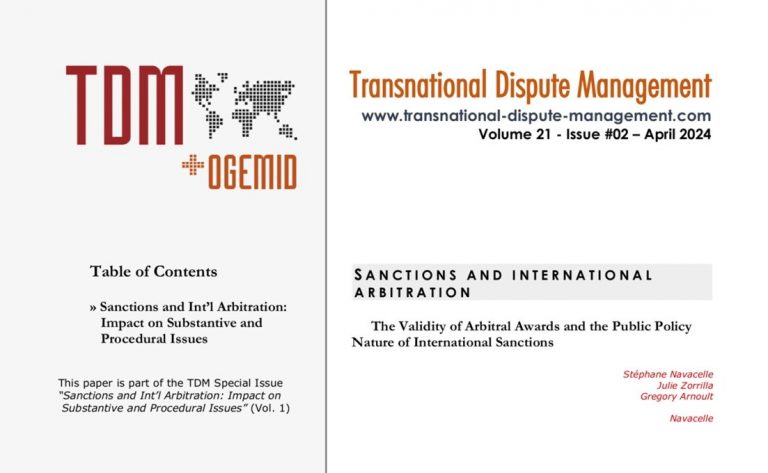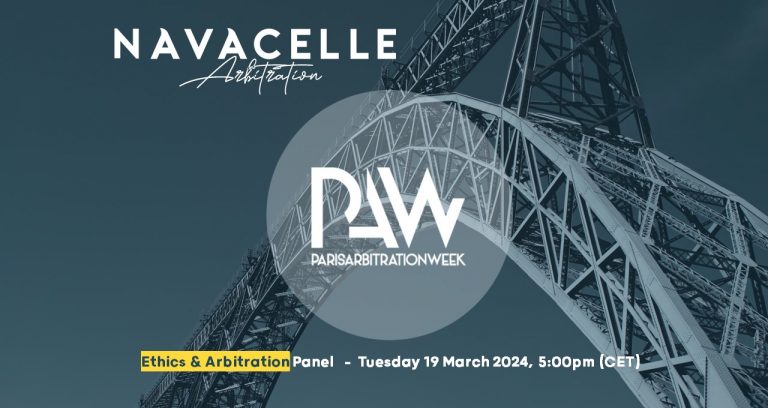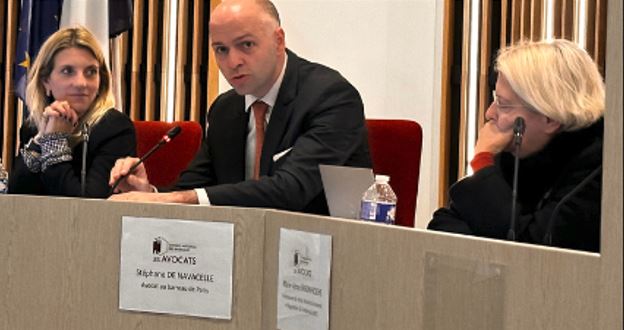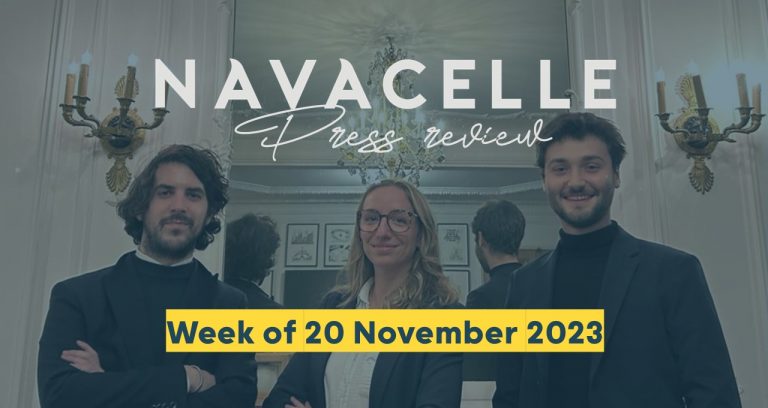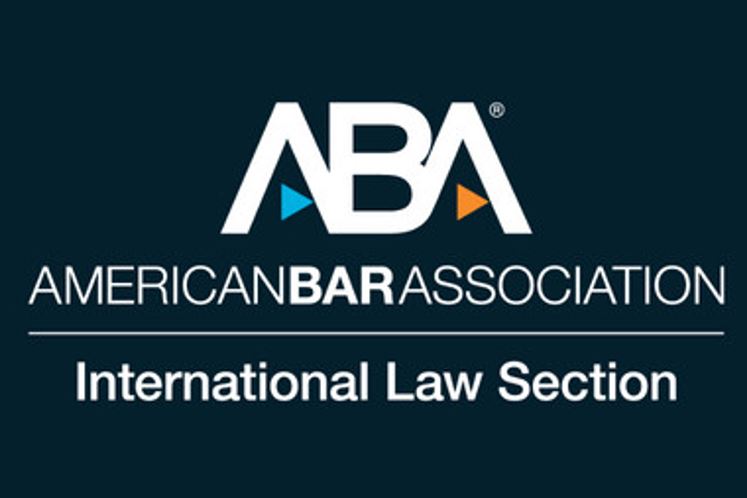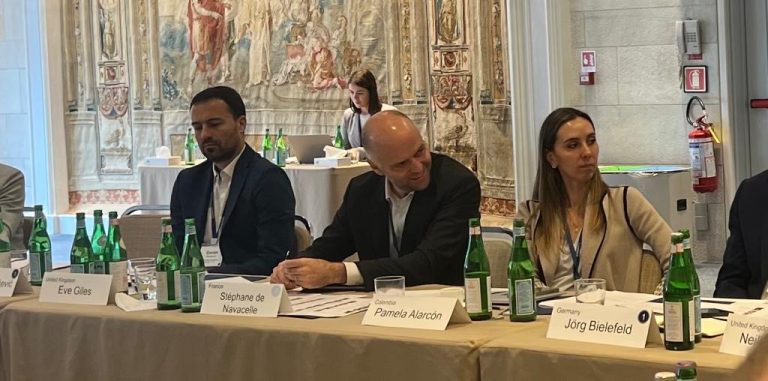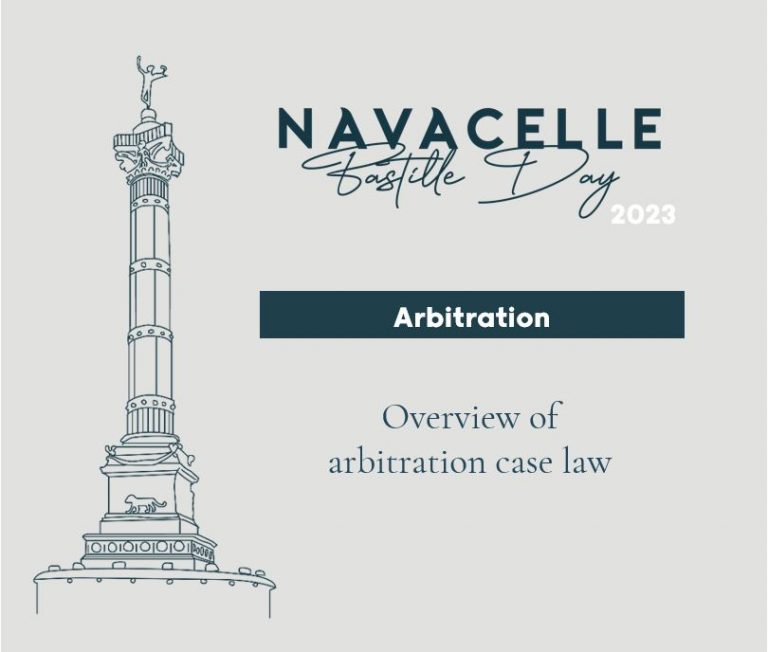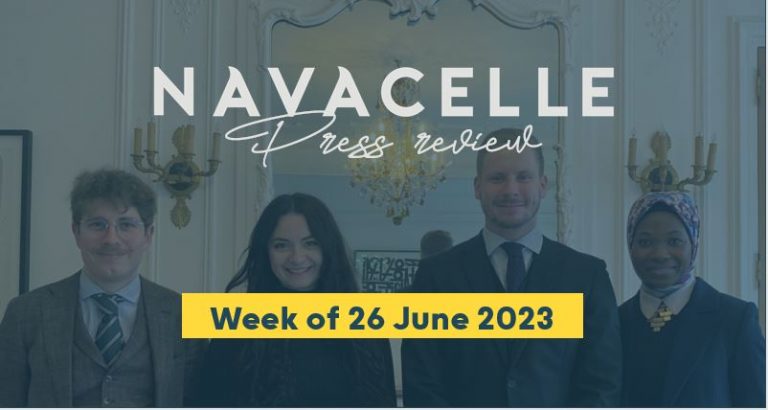Recent case law strengthens the control of the award to French international public order, which includes the fight against corruption. Accordingly, the courts do not hesitate to examine in detail claims arising out corruption allegations presented for the first time before the annulment judge. However, an adequate balance must be found between this control and the principle of procedural fairness or the prohibition of a review of the award on the merits. The speakers analyzed recent French case law and proposed avenues of reflection to preserve this balance between the various legal principles surrounding challenges to arbitral awards and questioned the practical impact of these decisions on Paris as a forum for international arbitration.
***
Stéphane de Navacelle: I want to thank our speakers. You all know them, of course, however, conventions require that I make a short presentation.
Laura Weiller is a lecturer in private law at Aix-Marseille University. She authored a thesis on the “Contractor’s procedural freedom” and numerous other articles and encyclopedias on trial litigation principles and domestic and international arbitration. She is also the editor of the arbitration section of the journal Procédures and contributes to the Revue de l’arbitrage. She also leads arbitration workshops of the Comité français de l’arbitrage.
Ina Popova is a partner at Debevoise & Plimpton, in the firm’s international dispute resolution practice. She handles cases in international arbitration, international litigation, public international law, as arbitrator and as counsel. She has experience in the energy, mining, technology, media, and telecommunications sectors.
My colleague Bernard Hanotiau, who is kind enough to be present with us, is an attorney admitted to the Brussels and Paris bar. He is a partner at the law firm Hanotiau & van den Berg, one of the partners of the PAW. He is a Professor Emeritus at the University of Leuven and visiting professor at the National University of Singapore. He has participated in over 500 arbitrations, as arbitrator, chair, counsel, and expert and regularly publishes on commercial law and international arbitration issues.
We have three arbitration specialists who will share with us the latest developments and recent decisions of the Paris Court of Appeal, and the consequences these decisions could potentially have on the situation of Paris in the international arbitration ecosystem.
The control of the award before the annulment or exequatur judge in the presence of corruption allegations.
SN: The issue is the control of the award of the annulment or exequatur judge. French case law encourages arbitrators to take into account and thoroughly analyze corruption allegations, even raising them ex officio if necessary. How far should the annulment judge should go in controlling the work of the arbitrators and to what extent does France trust arbitration?
There are many decisions that, in the name of international public order and the fight against corruption have focused, improperly some might say, on the awards to prevent a corruption contract from being given effect.
There are several cases I would like to mention. One, Webcor, a decision of the Paris Court of Appel which held that the veracity of the acts of corruption or the guilt of the parties is not a matter for the Court of Appeal to review in controlling the award, which is only intended to determine whether the recognition or enforcement of the arbitration award contradicts the fight against corruption and violates international public order. I would also like to mention the Belokon decision in which the Cour de cassation favored an extended review by the judges in case of serious violations. This control however applies to violations of international public order and is not a criminal law finding. With Belokon we have the Alstom case. The Cour de cassation overturned the decision of the Paris Court of Appeal for misapplication and referred the case back to the Versailles Court of Appeal without, however, discussing the ruling on the judge’s on the facts. Last week, the Versailles Court of Appeal conducted a complete and thorough extended review of the case and found no serious, precise, and consistent evidence of corruption and, therefore, no violation of international public order. I want to take this opportunity to congratulate my partner Julie Zorilla and my associate Salomé Garnier who have brilliantly pleaded for ABL.
I give you the floor, my dear Bernard, to discuss the Sorelec v. Libya case.
The Sorelec v. Libya case – an award set-aside on the basis of corruption claims that were not discussed in the arbitral proceedings.
Bernard Hanotiau: It is one of the first arbitral awards set aside based on corruption allegations that the parties did not raise before the arbitral tribunal. I find it interesting to present the Sorelec case because the facts are enlightening. I was an arbitrator, not the president, and I will explain the facts objectively. In 1979, a French company, Sorelec, concluded a construction-maintenance contract with the equivalent of the Ministry of Education of the Republic of Libya to construct 50 schools and 200 connected housing units in Libya. Sorelec, to fulfill its obligations, had built three prefabrication factories. In 1985, a dispute arose. The Libyan Government was not meeting its contractual obligations to pay Sorelec within 45 days. The Government exceeded 250 days of payment. Sorelec was, therefore, unable to fulfill its contractual obligations. Libya refused to hear anything as to the fact that the work was not progressing and called for guarantees from Sorelec. Moreover, the Libyan army seized the machinery, which made it impossible to perform the contract.
The company filed a request for the appointment of an expert to quantify the amount the Libyan Government owed them, which the Libyan State accepted, and the experts issued a final report on 15 June 1993. The report concluded that the Libyan Government was liable for 12 counts of non-compliance with contractual obligations, including failing to make payment on the dates set out in the contract.
The parties came together to conclude a settlement agreement to end the dispute. The parties concluded the settlement agreement on 19 December 1993. The Libyan Government was to reimburse the bank’s guarantees. The parties met to settle all the problems relating to the contract, including those arising out of the expert report, within three months. The Libyan Government reimbursed only the bank guarantees. On 23 September 1994, the parties signed an amendment to the settlement agreement, which provided for the payment of the remaining amount due and for the completion of the construction of the schools by Sorelec to obtain the remaining balance. However, the Libyan Government did not make any further payments.
In 2001, the Libyan Minister of Justice confirmed that Sorelec was entitled to payment for its services. The parties set up a special commission to establish the amount owed to Sorelec as compensation for damage suffered. The commission concluded that Sorelec’s claim was well-founded, and set the amount owed. The company agreed to a reduction of over 62.12% in exchange for immediate payment. However, no payment was made withing the set six-month deadline.
In July 2002, the parties met and drafted a report confirming the Libyan Government’s contractual obligations following two new concessions by Sorelec: payment of 50% of the amount due within 45 days and the balance within one month of the first payment. The Libyan State’s highest authority approved the agreement. However, once again, the Libyan Government did not make any payments.
Further reaffirmation by the Libyan authorities of their willingness to pay took place. The parties met in January 2003 and drafted a new agreement on 20 January that provided for the payment in 5 monthly installments and, in case of default of the Government, payment of the entire amount without the 62% discount. Once again, the Libyan Government did not make any payments.
On 12 March 2013, Sorelec introduced arbitration proceedings. An arbitral tribunal was constituted, composed of Eric Loquin, appointed by Libya, myself, appointed by Sorelec, and Yves Fortier, appointed as chairman. At the same time, Sorelec tried to seize the assets of the Libyan State in Belgium, France, and Holland.
Before the arbitral tribunal, Libya challenged the jurisdiction of the tribunal arguing there was no dispute because the State had already recognized its debt and undertook to pay the amounts agreed upon in 2003 as soon as the seizures were lifted. Alternatively, assuming there was a dispute, the matter was administrative in nature and, therefore, should be brought before the competent courts in Libya. In its submissions, Libya repeated its commitment to pay the amount owed. The arbitral proceedings went by smoothly, the parties exchanged submissions and exhibits, and the arbitral tribunal scheduled the hearing in January 2016 but postponed it to September 2016 at the parties’ request.
On 22 August 2016, Sorelec informed the arbitral tribunal of a settlement agreement entitled “Final agreement and arrangement relating to the arbitration proceedings” and requested that the tribunal certify the settlement agreement which referred to a Brussels Court of Appeal decision establishing Sorelec’s claim at 403 million euros, which the parties negotiated down in the settlement agreement to 230 million euros, including interests. The settlement also explained that if the Libyan State did not pay the discounted amount within 45 days of the arbitral tribunal’s confirmation, Sorelec would be entitled to claim the entire amount owed, i.e., 452 million euros. The Libyan Minister of Justice signed the settlement agreement.
Against all expectations, Libya’s counsel objected to the arbitral tribunal’s certification of the settlement agreement, arguing that the litigation department of the Ministry of Justice, which was the country’s representative in any proceedings against and for the State, did not approve it. They also argued that the Minister of Justice of the Provisional Government, and the Provisional Government itself, did not have the authority to represent the State per the United Nations Agreement signed in Morocco in December 2015 that empowered the Presidential Council of the Government of National Unity to represent Libya. After hearing the parties’ arguments, the arbitral tribunal considered Libya’s objections unfounded, both in relation to the signature of the Minster of Justice and of the Provisional Government. The tribunal concluded that Sorelec could reasonably have believed in the apparent legitimacy of the Provisional Government emanating from the Libyan Parliament to represent the State and sign the settlement agreement. The tribunal, therefore, certified the settlement and, in its award, ordered Libya to pay the sum of 230 million euros within 45 days. If Libya did not pay within this timeframe, Sorelec would be entitled to claim full payment under the settlement agreement. Libya did not pay, and the arbitral tribunal ordered in a final award Libya to pay Sorelec the sum of 452 million euros. Libya did not raise any allegation of corruption during the arbitral proceedings. We did not have any evidence that would have drawn our attention to the fact that there might have been corruption. Otherwise, we would have investigated the matter.
Libya challenged the arbitral tribunal’s award before the Paris Court of Appeal raising for the first-time corruption allegations. The Court of Appeal annulled the award on that basis and the Cour de cassation confirmed this decision.
What were these serious, precise, and consistent evidence of corruption that the Court of Appeal identified? The Appeal Court found such evidence in the political situation in Libya and in the settlement agreement itself. First, in relation to the political situation in Libya, the Court found that the country was ranked as one of the most corrupt countries and that the chaotic situation in the country was conducive to corruption. However, the fact that Libya is affected by corruption is not in itself proof of corruption. If we were to cancel all contracts in countries with a risk of corruption, we would cancel many contracts. Second, in relation to the settlement agreement, the transaction had to go through prior administrative approval under Libyan law. The absence of such approval was a serious and precise evidence of collusion between Sorelec and the Minister of Justice, which had been accused in another case. The Court also found that the absence of evidence surrounding the negotiation and the short duration thereof was incompatible with a serious process. Finally, the lack of reciprocal concessions in the terms and consequences of the settlement agreement made it clear that Libya had no interest in concluding it as it gained no economic or political advantage of it.
Most authors have found that the evidence relied upon by the Court were weak. As one commentator noted, the Court annulled the arbitral award without demonstrating who was the briber and who was bribed and did not identify either the means or the results. We are faced with a State that has never paid its debt, that has repeated that it would pay, and in the end, was able to keep all of Sorelec’s services without having to pay anything.
As for the consequences? Today, Paris has terrible press in the international arbitration community, and even in Paris, lawyers specialized in arbitration have said to me that they no longer provide for a Paris seat in their arbitration agreements. Instead, they recommend arbitration in Geneva or London.
As I am still involved in arbitrations where there are allegations of corruption, I reserve the right not to answer all the questions related to legal issues thereof and will limit myself to the issues presented in this panel.
SN: Thank you very much. It is quite natural. We are encouraged by the fact that criminal judges do not use similar factors to condemn a party in these proceedings. Ina Popova, what do the elements retained by the Court of Appeal mean in terms of legal certainty for the parties? The warnings are justified but, how do we deal with them and how do we analyze them?
The evidence of corruption used by the Court of Appeal when controlling the award.
Ina Popova: First of all, gathering serious, precise, and consistent evidence is a well-known evidentiary technique in France concerning concealed offenses. It is notably the case for evidence of insider trading before the Financial Market Authority. The Council of State has also long held that these evidentiary techniques were justified when the illegal transaction is deliberately concealed in nature as to not allow for direct evidence.
Regarding challenges to arbitral awards, the Alstom decisions pioneered this method for identifying corrupt practices. Courts also use this method in money laundering and economic sanctions cases (i.e., DNO Yemen’s decision of the Paris Court of Appeal).
What does this mean in practice? How does the Cour de cassation assess these clues? If we look at the ten or so judgments handed down by the French courts, we find that the Court of Appeal considered that the evidence was sufficient to establish the elements of corruption in 6 cases and found that they were insufficient in 4 cases. The decisions do not give a complete list of factors for judges to rely on.
Irrelevant factors include bad faith and procedural unfairness. This means a party may rely on its own corrupt practices without the annulment judge dismissing its case and without the need for these corruption allegations to have been raised before the arbitral tribunal. This was the case especially in Sorelec, Alstom and Securiport. Relevant factors that judges take into account include the circumstances surrounding the execution of the contract, notably the absence or insufficiency of negotiation, a significant imbalance in performance, non-compliance with the applicable national law, and finally, the particularly close relationship between the parties and the existence of dubious practices between them (i.e., gifts, payments).
How does the judge assess these factors? Some factors may have led to different conclusions. For example, regarding the absence or existence of criminal proceedings, the Court may consider criminal proceedings as a possible factor, provided that the evidence was obtained with due respect for human rights. Regarding the absence of prosecution, the Cour of Appeal in Sorelec first held that it was irrelevant because a State cannot be required to initiate corruption proceedings against an accused party. But in two subsequent decisions, the Court of Appeal found that the absence of proceedings made the corruption allegation less tangible, especially when the State raised the corruption allegations.
This method is casuistic and can create uncertainty for the parties, which is, to some extent, inevitable, as witnessed in Alstom.
SN: Thank you for this nuanced but realistic picture. Case law is in the course of being established and we must be careful not to fall into the wrong approach, notably adopted for French white-collar crime, which tends to switch the burden of proof, and which implies that a party must show the absence of something not to be guilty. Many complain about it, and we can find it here to some extent.
IP: Indeed, we can see from the decisions that some commentators find the case law too relaxed and sometimes too strict. To quote Professor Jarrosson, one sometimes has the impression that the recognition of corruption stems from a “light, ambiguous, and conflicting” set of factors.
SN: Indeed. Ms. Weiller, could you address the tension between consistent public order and procedural unfairness?
The tension between substantive public order and procedural loyalty.
Laura Weiller: I will place myself on a more legalistic level and of general reflection on this conflict between the need for effective control of compliance with public order and the principle of the prohibition of a review on the merits. Following other authors, I believe we must define the terms of the debate as there are multiple possible definitions of a review on the merits.
As the Cour de cassation held in Belokon, a review of the merits of the case is only prohibited if the judge substitutes his reasoning with that of the arbitrator after a new hearing that examines the entire merits of the case. Even if the annulment judge is required to analyze and characterize differently specific facts, particularly on the question of corruption, there is no review on the merits because the judge’s mission is to control whether the recognition or enforcement of the arbitral award would violate international public order.
On the other hand, a more general position deems that there is a review on the merits where the judge reaches a different conclusion on the substantive elements of the arbitral award. In this case, the full or maximalist review adopted by recent case law which dictates that no limitation is placed on the power of the annulment judge to investigate the elements in fact and law necessary to control the compliance with Article 1520 of the Code of Civil Procedure is a review on the merits. Thus, according to the Cour de cassation in Belokon, the review is not limited to the evidence produced before the arbitrators, and the annulment judge is not bound by the arbitrators’ findings, assessments, and determinations. This is a review on the merits.
Authors questioned the coexistence of a principle of prohibition of a review on the merits and the reality of such a review in relation to compliance with international public order. They concluded that a factual and legal review was indispensable for an effective review by the annulment judge, and that a general or absolute prohibition is incompatible with the protection of international public order. It follows from the Belokon decision that a different, reasonable, conception of the principle of prohibition of a review on the merits is required when it comes to compliance with international public order to allow for an adequate control of this compliance.
In my opinion, the question is not whether the judge should exercise a complete review, but how the judge should exercise this notably with regard to new elements. Must a complete review necessarily be accompanied by extrinsic control of the award, without being limited to the award? According to the case law, the answer appears to be positive. International public order seems to require the annulment judge to examine this even if the arbitral tribunal did not.
It also raises another question, namely, the reconciliation between compliance with international public order and raising, for the first time before the annulment judge, the corruption allegation notwithstanding the loyalty principle.
SN: Corruption allegations become a procedural strategy. You have a party whose behavior is reprehensible who will rely on its wrongful action to derail the arbitration.
LW: Or this party will keep some elements for later, with questionable moral behavior that does not entirely comply with the loyalty principle to which the Cour of cassation attaches great importance. Thus, the current legal situation is unsatisfactory, because the balance between compliance with public order and the need to avoid dilatory tactics has not been found.
SN: On the subject, Bernard Hanotiau of the review on the merits induced by this case law: what are the consequences of this undermining of the principle of prohibition of a review on the merits? What is the perception of Geneva’s position, for example?
Comparative approach of the principle of prohibition of the review on the merits.
BH: Foreign case law does not follow the French position. The Italian Court of Cassation says that violation of public order must be immediately apparent from the operative part and of the entire award and not after a comparison of the award and the factual elements examined by the arbitrator or after comparison of the award and the factual data the arbitrators did not have.
In Switzerland, in the Alstom case, the Federal Court ruled on the basis of the factual elements found in the award under control, and cannot rectify or supplement the findings of the arbitrators even if the facts have been established manifestly inaccurately or in violation of the law.
In Belgium, there is no immediate decision on the question but in a 2021 judgment, the Court of Cassation has stated that a court when deciding on the annulment or the enforcement of an award does not have to reassess the dispute in light of public order provisions that have been applied in the arbitral award. Instead, it only needs to verify whether the award and its recognition or enforcement violate international public order.
I believe it is more or less the same in England. In general, the French position is not followed abroad.
SN: It is a fundamental question of legal risk: Why choose Paris? Many colleagues will select another seat, as you said. What is your point of view, Laura Weiller, on the various available options to achieve procedural fairness in dealing with these issues of corruption that would arise after the arbitral award?
Handling corruption allegations in compliance with procedural equity.
LW: We can try to break it down into two steps.
First, regarding the unfairness for the party raising corruption for the first time before the annulment judge. There is a tension between the need for effective control of the compliance with public order and the introduction of new elements before the annulment judge for the first time. This tension is inevitable. Case law considers that Article 1466 of the Code of Civil Procedure does not apply to substantive public order arguments, as the public order of direction cannot be conditioned by the attitude of a party before the arbitrator. The Court supported this position in the Indagro, the Monster Energy, the Magpower and the Sorelec cases. This can therefore be raised before the annulment judge for the first time. In the Schooner case, the Cour de cassation stated that the recognition or enforcement of the award that would violate substantive international public order, grounded on Article 1520, 5° of the Code of Civil Procedure, may, because of their nature, be raised for the first time before the annulment judge and even raised ex officio.
This tension is problematic because the inapplicability of the rule of waiver to public order claims may be instrumentalized to the detriment of the principle of loyalty which is part of the procedural public order and leads to transform the nature of the control exercised by the annulment judge.
The state of the law may need improvement and one can question the complete applicability of Article 1466 of the Code of Civil Procedure to the substantive public order claims. Despite a dissenting opinion, I believe it is difficult to respond positively because the risk of incorporating in the legal order an award which would be contrary to public order is too high. Some authors have proposed distinguishing between contracts organizing corruption and those obtained by corruption, with only the latter having to comply with the rule Article 1466 of the Code of Civil Procedure.
All avenues that would allow for the arbitrators to handle first any element likely to be qualified as a violation of international public order must be explored. Accordingly, we could envision reestablishing the applicability of Article 1466 of the Code of Civil Procedure with a functional aim. The inadmissibility arising out of the breach of this provision could be raised ex officio by the annulment judge in order to refer the case to the arbitral tribunal. The party relying upon a new element that can characterize a violation of international public order would refer this claim to the arbitral tribunal. Before developing this hypothesis, akin to an application for review, I believe that it must be distinguished between the situation where the claim related to corruption has been raised before the arbitral tribunal or not. When corruption has not be discussed before the arbitral tribunal, procedural loyalty combined with the principle of prohibition of a review on the merits could lead to a favor for the arbitral tribunal to have it rule upon the allegedly new elements, i.e., via an application for review. Compliance with international public order would still be controlled but a posteriori, after the award has been rendered.
SN: It would be an alternative: either treats it itself or refer it?
LW: Yes. The authors that examined this have proposed to apply either the application for review under Article 595 of the Code of Civil Procedure, as in local court proceedings; an application which is fairly well defined but with drastic conditions, or a sui generis remedy which would correspond to article 34(4) of the UNCITRAL Model Law on International Commercial Arbitration, which provides that “The court, when asked to set aside an award, may, where appropriate and so requested by a party, suspend the setting aside proceedings for a period of time determined by it in order to give the arbitral tribunal an opportunity to resume the arbitral proceedings or to take such other action as in the arbitral tribunal’s opinion will eliminate the grounds for setting aside”. We would have a mechanism that would allow the arbitral tribunal to examine first the elements that may characterize a violation of public order and thus avoid a frontal breach of the review on the merits while thwarting procedural irregularity.
BH: I have made several reviews, so I agree with what you say. I find however that there are issues with procedure in terms of timing.
LW: There is a 2-month period, but I believe what is interesting is that an application for review and an annulment can be filed at the same time.
BH: In light of the French case law, we should be able to raise this issue, in all situations when there could have been corruption, even if there is no corruption. I had an arbitration a few years ago involving delivery of weapons by a French company to a Middle East sultanate. There was no evidence of corruption, but we asked the parties to confirm there were no hidden payments. Counsel said there were none. One could ask the parties and counsel to check whether there were hidden payments and insist until obtaining a clear answer. It would make it difficult to invoke corruption before the annulment judge if the parties previously claimed there was no corruption. It may be an idea. I am also in favor of a two-step application for the review process: first by determining the admissibility of the application, notably whether there has been a new element and take into account limitation period issues, and then a re-judgment on the merits.
LW: I like this, but I see a theoretical obstacle. To the extent that it would be similar to a confirmation of a void act, because we are in a matter of substantive public order, the confirmation may not be valid. But if both parties confirmed before the arbitrators that there were no elements that may characterize corruption, it seems complicated to argue afterward that there are.
Comparative approach of the examination by the judge of new elements.
IP: I put my common law hat back on to say that this is not the French exception but the French puzzle. These questions have been raised in France for several years, but it is not necessarily that complicated. Other courts have made other decisions. The Schooner decision rendered on issues of jurisdiction raises similar issues. Contracts of corruption and contracts obtained by corruption must be distinguished, this is the original issue with the World Duty Free v. Kenya case. We know that some contracts are void and others may be confirmed by the parties, not void ab initio. There may be waivers regarding issues of admissibility but not for issues of jurisdiction, but corruption can involve admissibility and jurisdiction. We also know that the arbitration agreement is independent of the contract in which it is contained. It is confusing.
We can give two examples of jurisdictions that have no difficulties in deferring to the findings of the arbitral tribunal on issues of public order and corruption.
In the United States, one cannot rely on evidence or arguments not raised before the arbitral tribunal when it could have been the case. The exception of violation of public order is only applied when the most basic notions of morality and justice of the State are involved. For example, in the Vantage Deepwater case which arose in the context of the Lava Jato scandal in Brazil, an award ordered Petrobras to pay 600 million US dollars. Petrobras objected to the recognition and enforcement of the award, arguing that the underlying contract was tainted by corruption. The courts (the federal District Court and the Court of Appeal for the 5th Circuit) rejected the argument of international public order, confirmed the award and held that it was not contrary to public order to enforce an arbitral award, which is distinct from the contract allegedly obtained by corruption so long as the award is not itself tainted by corruption. They also noted that Petrobras had waived any objection related to corruption when it ratified the underlying contract and that Petrobras had not established that the other party knew of or participated in corruption.
In England, the courts take a similarly restrictive approach, confirming the arbitral decisions except in exceptional cases. We know that fraud corrupts everything, and it is close to impossible to raise such arguments unless there is actual fraud. In the Alstom case, the High Court and Mrs. Justice Cockerill refused to accept the claim relying on a violation of international public order and confirmed the award. By doing so, the Court stated that Alstom could not rely upon this claim when enforcing the award because it did not raise this before the arbitral tribunal. The Court also distinguished between contracts of corruption and contracts obtained by corruption. The latest example comes from the Privy Council, in the Betamax case in 2021. The Mauritian Supreme Court annulled an award stating that the arbitral tribunal had made an incorrect ruling in relation to an issue of illegality not related to corruption. The Privy Council quashed the decision and stated that the courts cannot rule on such arguments except where there is fraud.
The intellectual and academic issues regarding the boundaries between the prohibition of a review on the merits, maximalist review, and the evidential technique allowing the judge to look for all the legal and factual factors have become very complicated in France, but it should not be the case.
SN: Any final words before we open the floor to questions?
LW: I reiterate my preference for a referral back to the arbitrator as soon as there is a new element likely to constitute a violation of international public order, because the principle of loyalty and the rule of priority given to the arbitrators to rule on issues of jurisdiction should not be set aside.
SN: Thank you to all three. Are there any questions from the floor?
The evolution of the control of the French judge.
Question of the audience: Is Paris’s position threatened by the recent case law? Today’s question is one for arbitration practitioners because it is the practitioners that are attached to the role of Paris compared to other seats. It is under this vision that we debate minimalist control and the maximalist review. Under a minimal review it will be said that the arbitrator has no forum and that control upon the award must be limited. Under a maximalist review the users of arbitration can expect that the Court applies all rules, including international public order.
What about the judge’s opinion, whom no one cares about? The question arises from the point of view of the practitioner, whose seat will be put in competition with other more favorable ones. It is true that Paris is favorable to arbitration because of the quality of the judges, the tools, and the material rules developed over the last 40 years. These are efforts to promote Paris’s position.
The judge does not apply investment law decisions where the question is whether corruption is an element of compliance of the investment with domestic laws or whether it is a matter of public order. The Court of Appeal does not consider this issue. In Cengiz v. Libya, the Court of Appeal stated that the issue of corruption falls within the scope of French international public order. The Paris Court of Appeal examines Article 1466 of the Code of Civil Procedure to determine what can be waived: one cannot waive substantive public order. After 30 years of reflection on control, the nature of control, the content of the rule, this is a given. The Court of Appeal and the Cour de cassation have identified the characterized violation, and the other criteria, obvious and flagrant, have been dismissed. We also ignore the principle that “the annulment judge is not the judge of the case; it is the judge of the award.” It will not determine whether the reasoning of the arbitrator is correct or not, but will judge whether Article 1520, 5° of the Code of Civil Procedure has been complied with and whether the award can be recognized or enforced. The criterion is whether the award complies with the fundamental values of the forum. The Court of Appeal considers that one of these fundamental values is the fight against corruption.
It is, therefore, not surprising, and we will not escape it for at least a decade. So, we must deal with it. In the Versailles Court of Appeal decision, no one questioned these criteria, and the Court simply examined them. This raises the question of the resources and the time of the judicial system. One must reflect, where there are no additional resources for the judicial system, on the application of Article 34 of the UNCITRAL Model Law. Maybe we should consider integrating this into French law. This will ensure due process and referring to the arbitrators. The Court of Appeal will either find that there is no corruption after a review under the list of clues that it developed or will have a doubt and will refer to the arbitral tribunal which, under a reasonable delay, will be better placed to rule on this. This applies to economic public order and allows for a secure process. We cannot remain with this impression of random and erratic case law.
Why is this better than a review on the merits? Because a review on the merits will not allow to examine all the corruption allegations that already exist but that the private party does not want to raise because it is often the one corrupting, or that the public party does not want to raise now because it will lose an argument before the annulment judge. There can be many cases that would fly under the radar. But if we refer to the arbitrators, they will be instructed.
IP: The American and English Courts are also judges of the award and not of the case. They simply consider that they are not in a better position than an arbitral tribunal to examine evidence that can exist. We see that when the Cour de cassation quashes the Alstom decision for misapplication. Maybe referring to the arbitral tribunal is a solution, but one cannot look at all the elements of fact or law if one does not have the means to do it properly, otherwise, it results in misapplication, and the parties find themselves, after 5 or 6 years of proceedings, in their initial state or back before the arbitral tribunal.
BH: You insist on the power of control, but there is no longer any control as soon as there is a new element presented.
Participant: I agree, but this is where the judge of the award intervenes. He will review but only with the idea of not letting an award be recognized or enforced in France notwithstanding the claim. In Cengiz, the Court of Appeal examined de novo the issue of corruption which had not been raised before the arbitrators.
How do we punish corruption?
Question of the audience: Can anyone explain how an arbitral award that obliges a state to pay for schools that have been constructed violates public order?
BH: One problem with this situation is that it takes two to bribe, so one gets away with it, and the other does not. In an award rendered in an investment matter, the arbitral tribunal invited the State party to pay a certain amount to a United Nations anti-corruption organization and the State did so.
SN: We have seen this in settlement agreements, in conventions judiciaires d’intérêt public in France or in deferred prosecution agreements. In Switzerland, a company had to pay money to the Red Cross in Switzerland as part of the agreement to avoid prosecution.
I want to point out that we invited judges to this panel discussion, but they refused due to their duty of discretion, which is perfectly understandable. The adversarial process is essential for this subject, and it is not a question of questioning anyone’s work.
IP: The answer to your question is that the Court of Appeal says you cannot let one party take advantage of this deal. Other Courts may have come to a different conclusion.
The interaction between criminal and arbitral proceedings.
Question of the audience: I want to discuss the two-month time limit for the application for review. It is, in fact, from the disclosure, knowledge of this new element, so it is not immediate. What about criminal proceedings? When you have an open criminal investigation in progress, but you only know that it is opened, without any information from the investigating judge or documents you can rely upon before the arbitrators to tell them there is a new element?
SN: We are confronted with this issue regularly. We have a hearing in the next few days before the commercial court, where the client says that she obtained the contract illegally by paying bribes, and you also have a case before the Parquet national financier. We must go in to discuss, since we know that there is a prosecutor in front of the commercial court, to ask in good faith that he discusses the investigation process which is subject to the secrecy of the investigation. We must come up with a proactive and cooperative approach, they will not intervene in commercial proceedings out of favor. We have criminal proceedings in parallel with arbitral tribunals. As soon as a party submits a document to the arbitral tribunal, you get a call from the prosecutor asking what this new document is and why it was not transmitted before. Thus, one can see that devious minds know how to use these authorities to the best of their abilities.
* * *
Learn more on corruption and arbitration :
- Jurisdiction and powers of international arbitral tribunals when dealing with allegations of corruption. Read publication
- Addressing corruption allegations in international commercial arbitration and investment arbitration. Read publication
- When arbitration and compliance meet up: analysis of their first interplay. Read publication
- Arbitration and Corruption : What type of control do judges have over arbitration awards ? Read publication



